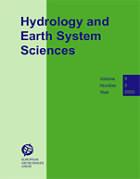|
Literature / Source Database:
Hydrology and Earth System Sciences
| Title (short) |
Hydrol. Earth Syst. Sci. |
| Title (abbrev) |
HESS |
| Languages |
English |
| First year |
1997 |
| Impact factor |
3.99 |
| Editor |
Hubert H.G. Savenije, Murugesu Sivapalan and Kurt Roth |
|
|

|
Status
active
Indexing
Current Contents, Science Citation Index and ISI Alerting Services
Subject

Source type
Journal
Publisher
ISBN ISSN
1027-5606
E ISSN
607-7938
First volume
1
Last volume
12+
Publish city
Katlenburg-Lindau
Homepage
| Resources |
|
Availability |
|
|
|
|
|
| Text PDF |
 |
free access |
 |
| Text Html |
 |
for subscriber |
 |
| References |
 |
not available |
 |
| Abstracts |
 |
|
|
| TOC |
 |
|
|
|
|
|
|

Description
Hydrology and Earth System Sciences (HESS) is an international journal for the publication of original research in hydrology, placed within a holistic Earth System Science context. In particular, HESS encourages and supports fundamental and applied research that seeks to understand the interactions between water, earth, ecosystems and man. A multi-disciplinary approach is encouraged that enables a broadening of the hydrologic perspective, and the advancement of hydrologic science through the integration with other cognate sciences, and the cross-fertilization across disciplinary boundaries. HESS, therefore, has the ambition to serve not only the community of hydrologists, but all earth and life scientists, water engineers and water managers, who wish to publish original findings on the interactions between hydrological processes and other physical, chemical, biological and societal processes within the earth system, and the utilization of this holistic understanding towards sustainable management of water resources, water quality and water-related natural hazards. The scope of HESS therefore encompasses: - the role of physical, chemical and biological processes in the cycling of continental water in all its phases, including dissolved and particulate matter, at all scales, from the micro-scale processes of soil water to the global-scale processes underpinning hydro-climatology.
- the study of the spatial and temporal characteristics of the global water resources (solid, liquid and vapour) and related budgets, in all compartments of the Earth System (atmosphere, oceans, estuaries, rivers, lakes and land masses), including water stocks, residence times, interfacial fluxes, and the pathways between various compartments.
- the study of the interactions with human activity of all the processes, budgets, fluxes and pathways as outlined above, and the options for influencing them in a sustainable manner, particularly in relation to floods, droughts, desertification, land degradation, eutrophication, and other aspects of global change.
Related links:
|